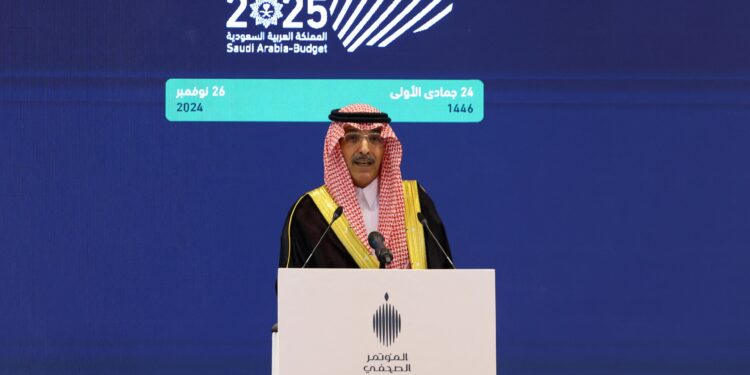Today, Tuesday, Saudi Arabia approved the 2025 budget, which expects a deficit of 101 billion riyals ($26.88 billion), while the Minister of Finance said that the Kingdom will continue spending on mega projects aimed at reducing the economy’s dependence on oil.
The deficit is consistent with initial expectations announced by the government in September, that it would be equivalent to about 2.3% of GDP.
Continue expanding
Finance Minister Mohammed Al-Jadaan said, “The 2025 budget aims to continue expanding strategic spending on development projects in accordance with sectoral strategies and Saudi Vision 2030 programs.”
The decline in oil prices and Saudi Arabia’s continued voluntary reduction in production have affected its revenues in the past few years, but the Kingdom is continuing to increase spending to promote growth and implement an economic transformation plan.
Total spending in 2025 is expected to reach approximately 1.285 trillion riyals ($342.05 billion), in line with September expectations, and this is likely to be equivalent to approximately 30% of GDP over the next three years.
Total revenues are also expected to reach 1.184 trillion riyals ($315.17 billion).
Vision 2030 requires hundreds of billions of dollars to develop new economic sectors and more sustainable sources of income in order to reduce the Kingdom’s dependence on oil and gas.
Crown Prince Mohammed bin Salman said, in comments published by the Saudi Press Agency (SPA), that “the positive indicators of the Saudi economy come as an extension of the ongoing reforms in the Kingdom in light of the Kingdom’s Vision 2030.”
The ambitious program includes building huge infrastructure projects to develop sectors such as tourism and manufacturing, attract billions of dollars in foreign investment and provide job opportunities for citizens.
#Saudi_Budget 2025 | Spending supports comprehensive development in various sectors. pic.twitter.com/lGC7gUuMgd
— Saudi Ministry of Finance (@MOFKSA) November 26, 2024
But as the costs associated with the projects increase, the Kingdom has recently stepped back to prioritize completing the facilities needed to host global sporting events over the next decade.
Monica Malik, chief economist at Abu Dhabi Commercial Bank, said, “The focus remains on progress in the transformation plan and investment program, with a limited deficit. This is expected to gradually increase government debt, thus maintaining the Kingdom’s strong (economic) fundamentals.”
Deficit financing
Al-Jadaan said that the Kingdom “aims to continue local and international financing operations with the aim of covering the expected deficit in the 2025 budget and repaying the principal due during 2025 and in the medium term.”
The Kingdom’s total public debt is expected to reach 1.3 trillion riyals ($346 billion) in 2025, which is slightly higher than current year’s estimates of 1.2 trillion riyals ($319.4 billion), and slightly less than 30% of the gross domestic product.
The Ministry of Finance revised its deficit estimates in 2024 to 115 billion riyals ($30.6 billion), compared to its expectations in September of 118 billion ($314 billion), equivalent to about 2.8% of the gross domestic product.
Total revenues for 2024 are estimated at approximately 1.23 trillion riyals ($327.38 billion), an increase of 4.9% over previous expectations, supported by non-oil activities, while total spending during the current year is estimated at approximately 1.345 trillion riyals ($358 billion), an increase of 7.5% over Previous forecast.
The economy is expected to return to growth this year after contracting in 2023, as the government expects GDP to grow by 0.8% in 2024 before it accelerates strongly next year to 4.6%, driven by an increase in non-oil activities, according to the Ministry of Finance.



